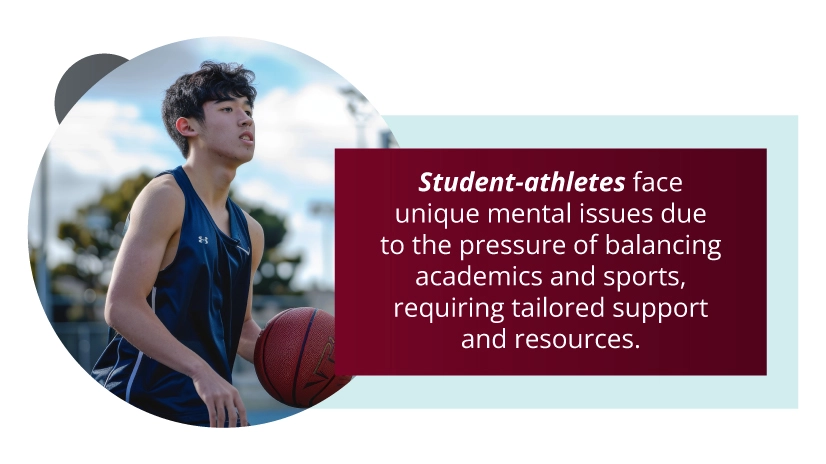
Strategies For Student-Athlete Mental Wellness
Student-athletes face unique pressures that can impact their mental health. Balancing academics, sports, and social life can be challenging. Many student-athletes feel the stress of excelling in both their studies and sports, which can lead to mental health issues like anxiety, depression, or burnout.
The demands of training, competitions, and maintaining good grades often leave little time for relaxation or self-care. Additionally, the pressure to perform well and meet expectations from coaches, teachers, and parents can add to their stress. Understanding these challenges is vital for providing the proper support.
This article explores the mental health issues common among student-athletes and offers strategies for managing these challenges.
Key Takeaways
Student-athletes face unique mental health challenges due to their demanding schedules and high expectations. This article covers:
- Different factors contribute to various mental health issues among student-athletes, such as anxiety and depression.
- Mental health issues among student-athletes can show up in different forms and can have negative consequences.
- A healthy lifestyle, a strong support system, and professional assistance can lead to improved mental well-being.
Indiana Center for Recovery offers comprehensive mental health support services. Call (844) 650-0064 to start your recovery journey.

Common Mental Disorders Among Student Athletes
Student-athletes are often under significant pressure, which can lead to various mental health issues. Here are some common disorders they might experience:
Anxiety Disorders
Anxiety disorders are common among student-athletes. These conditions can cause excessive worry and fear about performance or daily life. Symptoms may include constant nervousness, restlessness, and trouble concentrating. Anxiety can interfere with both academic and athletic performance.
Depression
Depression is another serious issue for student-athletes. It can lead to persistent sadness, loss of interest in activities, and feelings of hopelessness. This disorder often affects a person’s motivation and ability to enjoy life. Depression can make it difficult for athletes to stay focused and perform well in sports.
Eating Disorders
Eating disorders, such as anorexia and bulimia, are significant concerns for student-athletes. The pressure to maintain a certain body weight or appearance can lead to unhealthy eating habits. Athletes may become obsessed with their weight or body image, which can harm their overall health.
Stress-Related Disorders
Stress-related disorders can affect athletes of all levels, including student-athletes. High levels of stress from intense training and competition can lead to physical and emotional symptoms. These disorders may result from traumatic experiences or overwhelming pressure.
Substance Abuse
Substance abuse can be a huge problem for student-athletes trying to cope with stress or performance pressure. This includes the misuse of drugs or alcohol to manage pain, anxiety, or other issues. Substance abuse can lead to serious health issues and impact athletic and academic performance.
Factors Contributing To Mental Health Challenges
Student-athletes often face unique pressures that can lead to higher rates of mental distress. Here are some key factors contributing to mental health issues:
Academic Pressures
Academic pressures are a significant factor for student-athletes. They must maintain good grades while managing their sports commitments. This constant need to perform well in both areas can cause stress and anxiety. The fear of falling behind in school while keeping up with athletic demands can be overwhelming.
Athletic Performance And Expectations
The expectations placed on athletes to excel in their sports can lead to psychological issues. Coaches, teammates, and even family members often set high standards for performance. This intense pressure to succeed can lead to an increased risk of anxiety, depression, and a constant fear of not meeting these expectations.
Time Management And Workload
Another challenge is managing time effectively. Student-athletes juggle their schedules between classes, practice sessions, games, and other activities. The heavy workload and lack of free time can cause stress and make it difficult for them to find a balance, leading to burnout and mental exhaustion.
Injuries And Rehabilitation
Injuries and the process of rehabilitation can impact mental health significantly. Being sidelined from their sport can lead to feelings of frustration and sadness. The long recovery periods can also contribute to anxiety and depression as female and male athletes struggle to regain their previous level of performance.
Social and Personal Life Balances
Balancing social and personal life with athletic and academic demands is another challenge. Student-athletes often sacrifice time with friends and family to focus on their sports. This lack of social interaction and personal time can contribute to feelings of isolation and affect their overall well-being.
Signs And Symptoms Of Mental Health Challenges
Student-athletes face unique pressures that can significantly impact their mental health, often manifesting in various signs and symptoms.
Emotional Indicators
Emotional signs can reveal mental health struggles among student-athletes. These symptoms include:
- Persistent feelings of sadness or depression.
- Intense anxiety or excessive worry.
- Frequent mood swings or irritability.
- Loss of interest in activities that once were much fun.
- Feelings of having no self-worth.
- Difficulty concentrating or making decisions.
- Increased sensitivity to criticism or stress.
Behavioral Changes
Behavioral changes in student-athletes may signal mental health challenges. Look for these signs:
- Withdrawal from friends, family, or team activities.
- A decline in performance or effort during practices and games.
- Increased use of substances like alcohol or drugs.
- Avoidance of responsibilities or commitments.
- Changes in eating or sleeping patterns.
- Aggressive or erratic behavior.
- Frequent absences or lateness to practices or school.
Physical Symptoms
Physical symptoms can also indicate mental health problems in student-athletes. Be aware of:
- Unexplained fatigue or lack of energy.
- Frequent headaches or stomachaches without a clear cause.
- Sudden changes in weight or appetite.
- Difficulty sleeping or insomnia.
- Frequent physical injuries or illnesses.
- Rapid heart rate or breathing problems.
- Poor physical coordination or increased clumsiness.
Addressing these symptoms with care and seeking professional help can ensure better mental health and overall well-being for student-athletes.
Impact On Academic And Athletic Performance
Mental health challenges can significantly affect both academic and athletic performance for student-athletes. Here’s how these issues can impact their overall success:
Effects On Academic Achievement
Mental health issues can lead to decreased academic achievement. Student-athletes may struggle with concentration, memory, and organization due to stress or anxiety. Their academic performance may decline as they find it harder to keep up with assignments and exams. Persistent mental health problems can also result in absenteeism from school, further affecting their grades.
Impact On Athletic Performance
Mental health problems also impact athletic performance. Student-athletes might experience reduced motivation and focus during practices and competitions. Anxiety or depression can affect their physical performance, leading to poor results or even injuries. They may also struggle with teamwork and communication, further impacting their effectiveness on the field or court.
Long-Term Consequences
The long-term consequences of mental health issues can be significant. Persistent problems can lead to chronic stress, which affects both academic and athletic careers. Long-term mental health struggles may impact future opportunities, including college scholarships and career goals. Addressing these issues early can help prevent more severe consequences and support overall success.
Support Systems And Resources For Stable Mental Health
Student-athletes can benefit from various support systems and resources to help manage their mental health. Let’s explore some of these options:
Role Of Coaches And Athletic Trainers
Coaches and athletic trainers play a crucial role in supporting student-athletes. They can offer encouragement and be attentive to changes in behavior or performance. Head coaches and assistant coaches who are aware of mental health concerns can create a supportive space and help young athletes balance their sports and academic commitments. Athletic trainers can also provide guidance on managing stress and recovery.
Mental Health Services On Campus
Many schools, colleges, and universities offer mental health services on campus for students, including male and female athletes. These services might include a counseling center where students can talk to trained mental health professionals about their issues. Campus services often provide workshops, support groups, and one-on-one sessions to help students cope with stress, anxiety, and other mental health challenges.
Peer Support Networks
Peer support networks are another valuable resource. These networks include friends, team members, and student organizations that offer emotional support. Sharing experiences with peers who understand the pressures of being a student-athlete can be comforting. Peer support can help reduce feelings of isolation and provide encouragement during tough times.
External Counseling And Therapy Options
External counseling and therapy options include various approaches to mental health care.
- Cognitive behavioral therapy (CBT) helps with changing negative thought patterns.
- Dialectical behavior therapy (DBT) focuses on emotional regulation and interpersonal skills.
- Eye movement desensitization and reprocessing (EMDR) is used for trauma and stress relief.
These therapies can be accessed through mental health professionals outside of the school setting.
Strategies For Improving Mental Health
Improving mental health is essential for student-athletes to thrive both academically and athletically. Here are some best practices for enhancing mental well-being.
Stress Management Techniques
Managing stress is crucial for maintaining mental health. Techniques such as deep breathing exercises, mindfulness, and relaxation practices can help reduce stress levels. Regularly practicing these methods can help student-athletes stay calm and focused, both in academics and sports. Stress management techniques are essential for handling the pressures of student-athlete life effectively.
Importance Of Rest And Recovery
Rest and recovery are vital for mental health. Adequate sleep and downtime allow the body and mind to recover from daily stressors. Student-athletes should prioritize getting enough sleep and taking breaks from their routines. This helps maintain a healthy balance and prevent burnout. Ensuring regular rest can enhance both physical and mental performance.
Building Resilience And Coping Skills
Building resilience and coping skills is important for managing challenges. Resilience helps individuals bounce back from setbacks and stay motivated. Developing coping skills, such as problem-solving and positive thinking, can make it easier to handle difficult situations. Practicing these skills can help student-athletes face challenges with a more balanced and optimistic mindset.
Time Management Skills
Effective time management is essential for balancing sports, academics, and personal life. Student-athletes should plan their schedules to include time for study, practice, and relaxation. Using planners or digital tools to organize tasks can help manage workload and reduce stress. Good time management skills ensure that athletes can meet their responsibilities without feeling overwhelmed.
Importance of Healthy Lifestyle Choices
Making healthy lifestyle choices supports mental health. Eating nutritious foods, staying hydrated, and engaging in regular physical activity contribute to overall well-being. A balanced diet and regular exercise can improve mood and energy levels. Adopting these healthy habits is key for maintaining mental and physical health throughout the athlete’s journey.
Frequently Asked Questions (FAQ)
Being a student-athlete can affect mental health in both positive and negative ways. On one hand, it can boost confidence, discipline, and social connections. On the other hand, the pressure to excel academically and athletically can lead to stress, anxiety, and burnout. Balancing practice, games, and studies often results in less time for relaxation and self-care. School and college student-athletes must seek support and manage their time effectively to maintain good mental health.
some ways to help:
- Encourage open conversations about mental health.
- Provide school and college students with access to counseling and educational resources.
- Promote a balanced schedule between academics, sports, and relaxation.
- Educate coaches and teammates on recognizing signs of stress and burnout.
By fostering a supportive environment, we can help student-athletes thrive both mentally and physically.
Student-athletes often face unique mental health challenges due to the demands of balancing academics and sports. Common issues include:
- Social Anxiety: Pressure to perform well in both sports and academics can lead to anxiety.
- Depression: The stress of constant training and playing time may contribute to feelings of depression.
- Injury-Related Stress: Injuries can cause significant emotional distress, impacting self-esteem and identity.
- Burnout: The intense schedule can lead to physical and emotional exhaustion.
These challenges highlight the need for mental and emotional health support in high school and college athletes.



